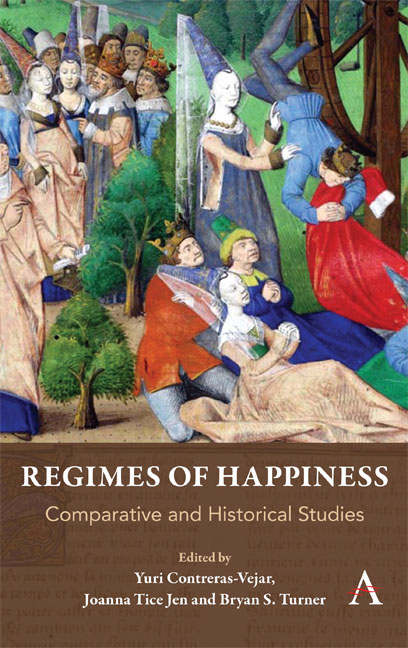Book contents
- Frontmatter
- Contents
- Acknowledgements
- Notes on Contributors
- Introduction: Reflections on Regimes of Happiness
- Part I Happiness in the West
- Chapter One A Fragment of Bliss: Augustinian Beatitudo and the Ideal of Atonement
- Chapter Two Arts of Happiness and Love: Translating Aristotle in the Later Middle Ages
- Chapter Three Spiritual Transcendence as the Path to Happiness in a Selection of Old French Texts
- Chapter Four On Machiavelli, St. Francis and the Pursuit of Happiness
- Chapter Five Their Idea of Happiness Prevents Easy Categorization of Scottish Enlightenment Philosophers
- Chapter Six A Path to Eternal Happiness: Convent Life in the United States in the Nineteenth Century
- Chapter Seven “Be Joyful Always!”: Twenty-First-Century Evangelical Conceptions of Happiness and Trumpist Politics
- Chapter Eight The Erasmus Program: The Promise of European Happiness
- Chapter Nine Innovations in the Psychological Study of Happiness: From Mirror Neurons to Mobile Technology
- Part II Comparative Perspectives
- Index
Chapter Seven - “Be Joyful Always!”: Twenty-First-Century Evangelical Conceptions of Happiness and Trumpist Politics
from Part I - Happiness in the West
Published online by Cambridge University Press: 29 May 2019
- Frontmatter
- Contents
- Acknowledgements
- Notes on Contributors
- Introduction: Reflections on Regimes of Happiness
- Part I Happiness in the West
- Chapter One A Fragment of Bliss: Augustinian Beatitudo and the Ideal of Atonement
- Chapter Two Arts of Happiness and Love: Translating Aristotle in the Later Middle Ages
- Chapter Three Spiritual Transcendence as the Path to Happiness in a Selection of Old French Texts
- Chapter Four On Machiavelli, St. Francis and the Pursuit of Happiness
- Chapter Five Their Idea of Happiness Prevents Easy Categorization of Scottish Enlightenment Philosophers
- Chapter Six A Path to Eternal Happiness: Convent Life in the United States in the Nineteenth Century
- Chapter Seven “Be Joyful Always!”: Twenty-First-Century Evangelical Conceptions of Happiness and Trumpist Politics
- Chapter Eight The Erasmus Program: The Promise of European Happiness
- Chapter Nine Innovations in the Psychological Study of Happiness: From Mirror Neurons to Mobile Technology
- Part II Comparative Perspectives
- Index
Summary
Traditionally, Christianity views happiness as a state not guaranteed during earthly life, but promised to Christians in the afterlife. Myriad Old Testament stories make this traditional view clear, from the fall of Adam and Eve to the travails of Job. In the New Testament, the Beatitudes of Jesus's Sermon on the Mount emphasize the blessings to come in the next life and the suffering to be found on earth. Every tradition has a different interpretation of these and other biblical discussions of happiness, but earthly life as suffering tends to be a prominent theme in many Christian understandings. How do contemporary evangelicals— the largest religious group in the United States and a rapidly growing force globally— conceptualize happiness?
This question holds special significance for contemporary American politics because of the strong evangelical support for President Donald Trump. But what connection is there, if any, between evangelical views of happiness and the evangelical political orientation? Alongside a Catholic priest and a Jewish rabbi, four evangelical pastors presided over the Trump inauguration in January 2017: Pentecostal televangelist Paula White- Cain, evangelist and missionary Franklin Graham, pastor and president of the National Hispanic Christian Leadership council Samuel Rodriguez, Jr. and Pentecostal Bishop Wayne T. Jackson. If anything, the inaugural invocation and benediction prayers were a high- visibility display of the diversity of evangelical belief in general and views of happiness specifically. The views expressed in [the] inaugural prayers included: the prosperity gospel (White- Cain), the blessing of the poor and humble found in the Beatitudes (Rodriguez), the connection between earthly and divine authority (Graham) and unity among Americans through an allusion to Martin Luther King, Jr.'s recitation of the gospel song “we shall overcome” at his final sermon before he was assassinated (Jackson, 2017). While the prosperity gospel— which sees financial prosperity as a sign of God's blessing (Balmer, 2002)— as well as the connection between divine authority and earthly authority might seem most in line with Trump's political vision, the evangelical movement does not necessarily share the views expressed by the pastors who read at the inauguration.
- Type
- Chapter
- Information
- Regimes of HappinessComparative and Historical Studies, pp. 93 - 110Publisher: Anthem PressPrint publication year: 2019

